|
|
|
Sort Order |
|
|
|
Items / Page
|
|
|
|
|
|
|
| Srl | Item |
| 1 |
ID:
178357
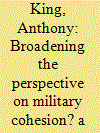

|
|
|
|
|
| Summary/Abstract |
In 2018, Ilmari Käihkö published a special collection in Armed Forces & Society on the debate about small unit cohesion. Later, in reaction to a response by Guy Siebold, he published a further intervention with Peter Haldén. Focusing on my 2006 article in the journal and my subsequent debate, Käihkö has claimed that the cohesion debate is too narrow. It ignores organizational factors in the armed forces and wider political factors, including nationalism and state policy. Consequently, it is incapable of analyzing non-Western state or irregular forces and is only relevant for the 20th and 21st centuries. This response shows that while Käihkö’s extension of the empirical archive to non-Western armed groups is to be welcomed, none of his theoretical claims are sustainable.
|
|
|
|
|
|
|
|
|
|
|
|
|
|
|
|
| 2 |
ID:
178346
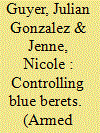

|
|
|
|
|
| Summary/Abstract |
Peacekeeping has widely been seen as conducive to submit the military to democratic rule. We put the assumption to an empirical test based on the case of Uruguay, today a fully democratic state that has consistently ranked among the world’s top peacekeeping contributors per capita. Specifically, we ask whether participation in peacekeeping has increased civilian control over the military. To answer this question, we focus on three aspects of democratic civil–military relations: civilian oversight, civilian policy management, and armed forces–society relations. We conclude that peacekeeping has done little to trigger greater involvement of civilians in the area of military and defense policy but that it contributed to reduce the gap between the armed forces and society. Nevertheless, due to political neglect by civilian authorities, the state of civil–military relations is one of subordinate military autonomy short of ideal, even if it does not represent a threat to democratic rule.
|
|
|
|
|
|
|
|
|
|
|
|
|
|
|
|
| 3 |
ID:
178349


|
|
|
|
|
| Summary/Abstract |
Despite repeal of the Don’t Ask, Don’t Tell policy in 2011 and the ban on open transgender service from 2016 to 2019, lesbian, gay, bisexual, and transgender (LGBT) service members may be reluctant to disclose their identities to fellow military personnel. This study used data collected through the Department of Defense–funded mixed methods research study conducted from 2016 to 2018. A sample of 248 active duty LGBT service members completed a survey, while a sample of 42 LGBT active duty service members participated in an in-depth interview. Regression analyses tested for differences in outness by demographic and military traits; a thematic analysis of qualitative data contextualizes these findings. Outness to fellow service members varied greatly by rank, military branch, education level, sexual orientation, gender identity, and marital status. The lowest outness was to chaplains (38%), while the highest outness was to LGBT unit friends (93%). Implications for military leadership and service providers are discussed.
|
|
|
|
|
|
|
|
|
|
|
|
|
|
|
|
| 4 |
ID:
178351
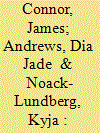

|
|
|
|
|
| Summary/Abstract |
Loyalty between soldiers is idealized as an emotion that promotes cohesion and combat effectiveness. However, little empirical work has examined how military personnel understand, feel, and enact loyalty. We use a symbolic interactionalist informed frame to explore the lived experience of 24 retired Australian Defence Force members via in-depth semi-structured interviews. Our analysis revealed three core themes: (1) Loyalty as reciprocity, where there was an expectation that loyalty would be returned no matter what. (2) The importance of emotional connection for cohesion. (3) Loyalty as a prioritizing process, where a soldier’s loyalties gave them a way of choosing between competing demands. Loyalty is a moral emotion that enabled sensemaking. Close interpersonal loyalties tended to trump wider/diffused loyalties. Respondents understood their loyalties to fellow soldiers within wider social constructs of mateship and professionalism. The findings show the risks that come from a reliance on loyalty for combat cohesion.
|
|
|
|
|
|
|
|
|
|
|
|
|
|
|
|
| 5 |
ID:
178345
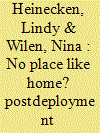

|
|
|
|
|
| Summary/Abstract |
This study focuses on soldiers returning from peacekeeping missions and the challenges they experience adapting to the home environment in the postdeployment phase. The article focuses on South African peacekeepers returning from missions in Darfur/Sudan, the Democratic Republic of Congo, and Burundi. Interviews with 50 South African peacekeepers on the challenges they face in terms of their homecoming, family reintegration, and military support were conducted. Overall, the study found that both external military factors such as deployment length and nature of mission, and internal factors specific to the soldier affected reintegration. We highlight three major findings of our study: Firstly, our analysis show that peacekeepers across gender, rank, and race identify the absence from their children as a major challenge. Secondly, while relational turbulence characterized by ambivalence and concerns about infidelity was prevalent among all, there was a clear difference in the answers between the male and female peacekeepers. Thirdly, a large majority voiced the need for more support from the military institution for their families, before, during, and after deployment.
|
|
|
|
|
|
|
|
|
|
|
|
|
|
|
|
| 6 |
ID:
178348


|
|
|
|
|
| Summary/Abstract |
Endorsements by retired flag and general officers are now a fixture of the presidential election cycle. However, their motivations are unclear. Retired flag officers might endorse with material, purposive, or solidarity motives. We evaluate these motivations with a new data set of 1,340 endorsements by 1,041 endorsers between 2004 and 2016 matched with campaign contributions. We find that campaign contributions, service in the Navy, and retiring as a higher ranked officer are all associated with an increased likelihood of endorsing. We conclude that about 10 retired flag officers participate to improve their material situation, 193 seek to advance their ideological preferences, and the remainder participate to demonstrate solidarity with their peers or acquaintances. These findings provide new insight into endorser motivations and civil–military relations.
|
|
|
|
|
|
|
|
|
|
|
|
|
|
|
|
| 7 |
ID:
178347
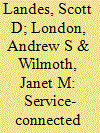

|
|
|
|
|
| Summary/Abstract |
Research consistently reports a veteran mortality disadvantage relative to nonveterans, but has not considered the contribution of service-connected disability to this differential. We use data from the 1986 and 1989 National Health Interview Survey-2011 Linked Mortality Files (N = 124,122) to estimate multivariate Cox regression models of the association between veteran status and mortality, taking service-connected disability status into account. Bivariate analyses demonstrate higher mortality risk, lower socioeconomic status, and poorer health and functioning among veterans with a service-connected disability than among nonveterans and veterans without a service-connected disability. Multivariate models confirm a mortality disadvantage for all veteran service-connected disability subgroups, which is reduced by the inclusion of exogenous sociodemographic variables and substantially mediated by the health/functional limitation status measures. Results indicate that service-connected disability status accounts for some variation in, and may have a cumulative effect on, the veteran mortality disadvantage. When possible, future research should account for service-connected disability status when studying veteran–nonveteran mortality differentials.
|
|
|
|
|
|
|
|
|
|
|
|
|
|
|
|
| 8 |
ID:
178358


|
|
|
|
|
| Summary/Abstract |
In October 2018, Armed Forces & Society published a special issue that called for a theoretical and methodological broadening of the study of cohesion. In a response, King accuses me of ignoring his 2013 book The Combat Soldier, which he feels had already made this call redundant. This answer explains why this is not the case. The Combat Soldier ticks the three boxes of modern, Western, and state military that have dominated the study of cohesion. The resulting narrow vantage point affirms problematic assumptions of Western concepts as absolutes with universal validity with little room for other models of sociopolitical interaction. This becomes especially problematic when King defines cohesion as tactical-level combat performance, the be-all and end-all of what makes, and decides, war. The answer concludes with an appeal for truly interdisciplinary future studies of war that a broader understanding of cohesion, among other things, depends on.
|
|
|
|
|
|
|
|
|
|
|
|
|
|
|
|
|
|
|
|
|